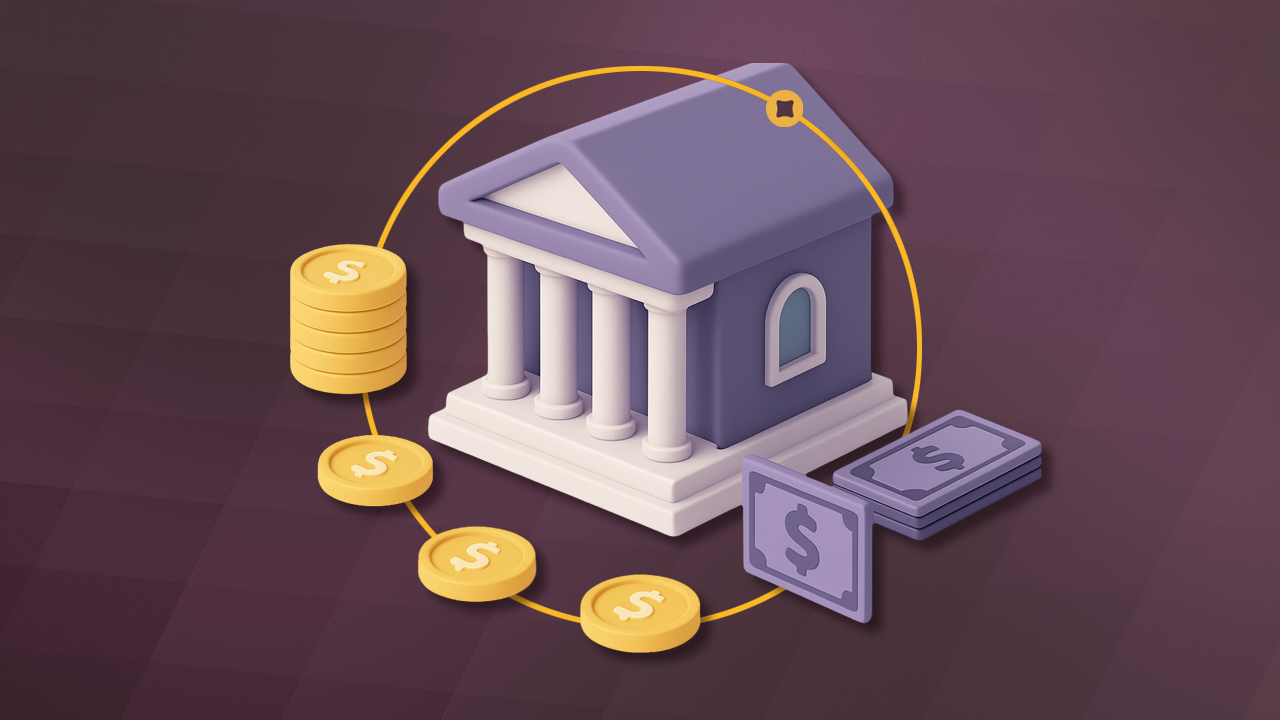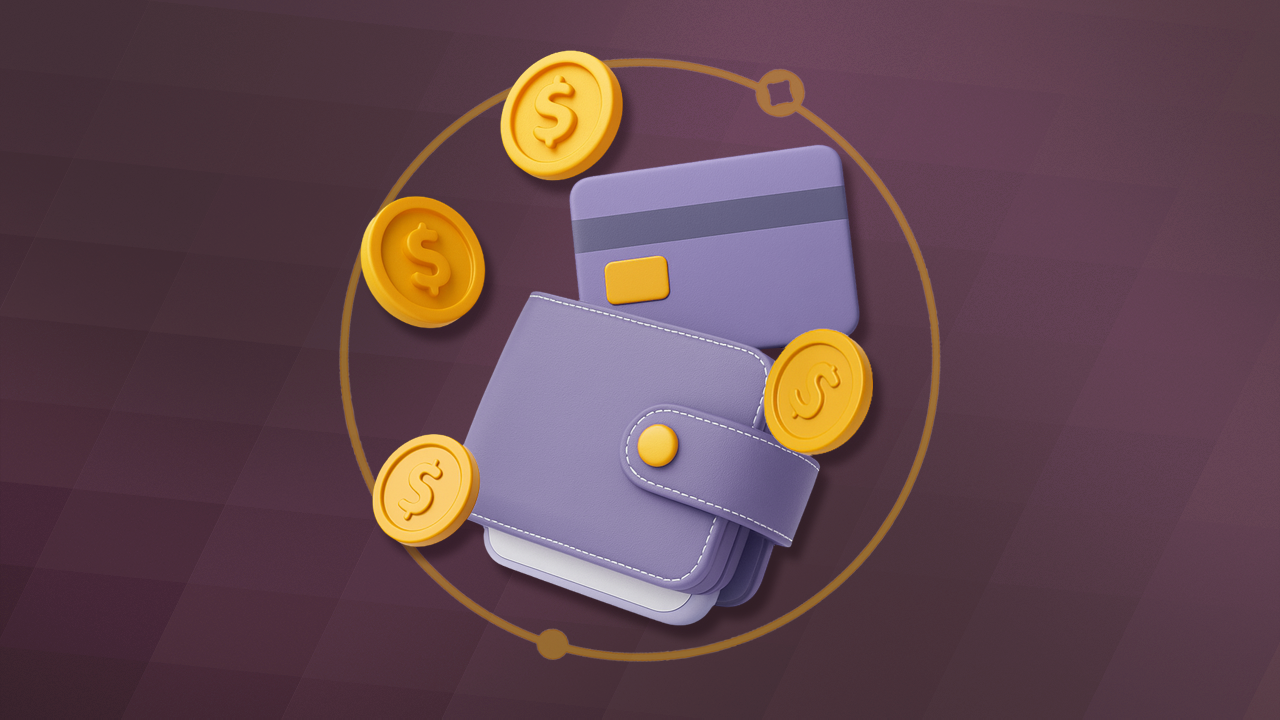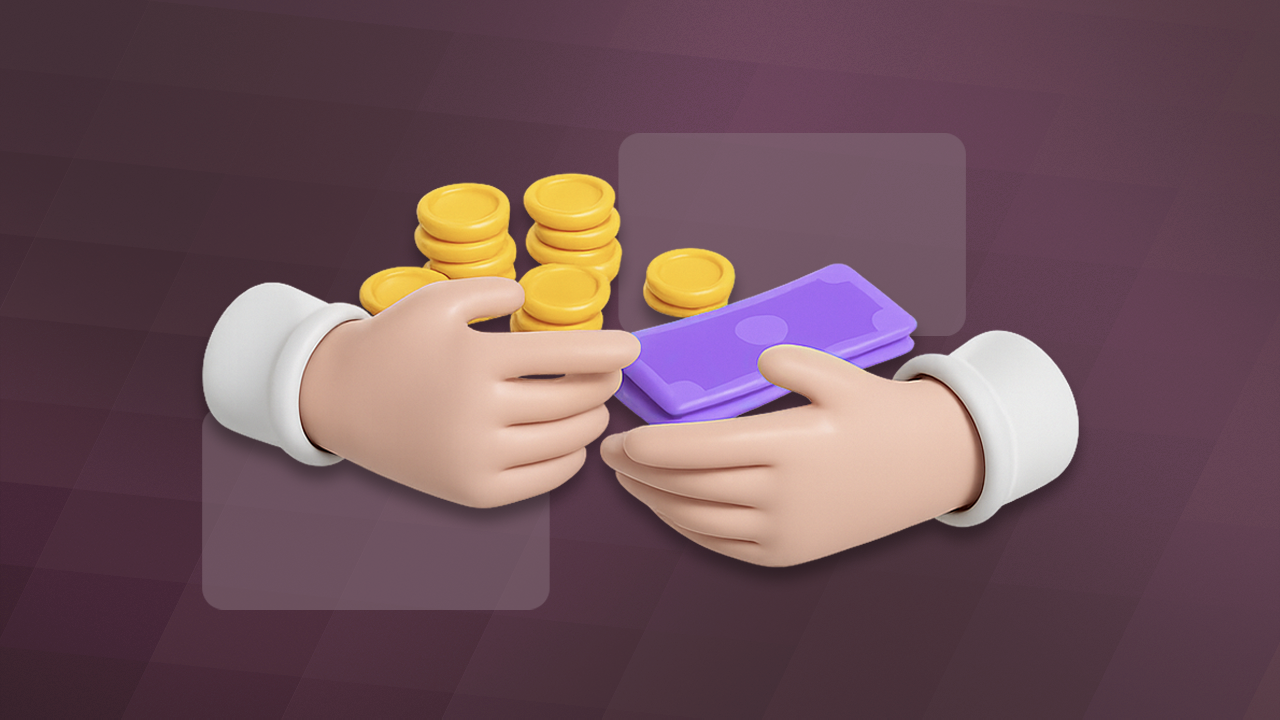Stripe might be one of the most popular payment processors on the market, but for many businesses it’s also one of the most expensive.
Payments via Stripe are often done through credit card, with processing fees for incoming payments being 2.9% + $0.30 per domestic transaction, with extra fees for international cards and currency conversion.
Stripe’s 2.9% card fee chips away at your margins on incoming payments, plus there are hefty fees for sending payments as well, but Nickel turns the tables. For incoming payments, invoice through Nickel and you can pass that 2.9% card fee directly to the customer, keeping your full invoice amount.
Combine that with Nickel’s free ACH transfers (incoming and outgoing) and you end up saving money on both sides of every transaction; proof that a platform built around free ACH transfers and reasonable card payment terms is a smarter choice for protecting profit.
If you're starting to question if Stripe is still the right fit or just looking for a more cost-efficient alternative for payment processing, you’re not alone.
Let’s take a closer look at the fees you’ll pay when receiving credit card payments through Stripe, compared to alternative and more cost-effective methods, such as Nickel.
Key Takeaways
- Stripe credit card fees are 2.9% plus $0.30 per transaction, and up to $5 for ACH transfers, which adds up fast for large B2B payments
- A $25,000 invoice through Stripe can cost $725.30 in credit card processing fees
- Nickel saves you money on incoming credit card payments by passing the 2.9% card fee to customers, which means you keep 100% of each invoice instead of losing margin to processing costs.
- A $25,000 client payment on Nickel with pass-through saves you $725.30 compared with Stripe, turning card acceptance into a fee-neutral revenue booster.
- Nickel also offers unlimited free ACH transfers for both making and receiving payments
- Switching even 50% of your monthly payments to Nickel ACH can save $34,800 annually (based on a transaction volume of $200,000 per month)
- A full switch to Nickel ACH from Stripe card processing can save $69,600 a year (based on a transaction volume of $200,000 per month)
- Nickel integrates directly with QuickBooks and supports approval workflows and payment scheduling
Understanding the Real Cost of Stripe Fees
Before evaluating the alternative, it’s important to understand just how expensive Stripe can be, especially for businesses handling large or recurring payments.
At its core, Stripe charges 2.9% + $0.30 for each successful domestic credit card transaction. That might seem manageable at lower volumes, but it scales quickly.
A $25,000 transaction, a common invoice amount for B2B sales, incurs a whopping $725.30 in processing fees. And that’s only if the card is domestic and doesn’t require currency conversion.
Once you factor in other fees, the costs climb higher:
- +1.5% for international cards
- +1% for currency conversion
- +0.5% for manually entered cards (e.g., over the phone)
That means a business processing $100,000 per month in incoming card payments could be paying upwards of $3,000 monthly in fees, money that directly cuts into profit margins.
The bottom line is that Stripe keeps 2.9% + $0.30 of every card payment made to you, but platforms like Nickel let you tack that same 2.9 % onto the customer’s total. So, invoice a client for $10,000, your client sees $10,290, and you still receive the full $10,000.
Extra Fees Add Up, Too
Stripe’s pricing model also includes additional charges that catch many businesses off guard:
- Expedited payouts cost extra if you want faster access to your funds.
- Invoice generation via Stripe's billing tools costs 0.4% per invoice (capped at $2), adding another layer of cost for businesses that invoice frequently.
- Dispute fees for chargebacks run $15 each, even if you win.
And while there are no monthly fees, Stripe’s pricing structure becomes far less favorable once your business scales beyond small transactions.
Why It Matters
For businesses that operate on thin margins, like B2B platforms, suppliers, distributors, and manufacturers, these fees can be brutal.
Fortunately, there are more cost-effective alternatives out there; platforms with flat-rate fees, the ability to pass credit card fees to customers, zero ACH charges, and better support for B2B workflows.
Stripe is sleek and developer-friendly, but if profitability is a top priority, it might not be the best long-term partner.
Why Traditional Payment Processors Miss the Mark for B2B Businesses
Stripe is optimized for retail and direct-to-consumer sales, but B2B transactions follow a completely different rhythm. Below, we discuss the issues that make Stripe a poor fit for many B2B companies.
High Credit Card Processing Fees Add Up Quickly
Stripe’s standard fee of 2.9% + $0.30 per transaction may not seem alarming, until you apply it to a $50,000 B2B invoice.
That’s $1,450.30 in fees gone instantly. Stripe also tacks on 1.5% for international cards and 1% for currency conversion, which can push your total cost even higher.
This fee structure is more sustainable for smaller online purchases but becomes a major drain on companies handling several high-value transactions each month.
Compare this to a service like Nickel, which allows you to pass the 2.9% processing fee onto your customers and doesn’t charge an additional $0.30 per transaction, and Stripe starts looking quite unaffordable for smaller and larger businesses alike.
As we’ll explain in further detail below, Nickel is a great way to get rid of fees associated with processing credit card payments, and an even better way to eliminate fees altogether by switching to Nickel ACH payments, which are 100% free of cost. However, before we get to that, there are some other glaring issues with Stripe.
For more information, find out the main differences between credit card and ACH payments.
Core B2B Tools Are Missing or Fragmented
Stripe lacks several features that are essential to B2B workflows:
- Net terms management for clients who pay on 30-, 60-, or 90-day cycles
- Partial payments and payment plans
- Easy QuickBooks or ERP integrations without relying on third-party apps
- Team-based billing permissions and approvals
B2B companies are often forced to use additional software to get these capabilities, adding complexity, subscription fees, and operational friction. For example, clients who use Nickel have full QuickBooks integration, allowing for streamlined and simplified payment processing.
Better B2B Options Exist
If your business is invoicing large amounts, managing long payment cycles, or needs better cash control, there are smarter alternatives. Purpose-built B2B payment platforms offer:
- Flat-rate or free ACH options
- Lower credit card fees
- ERP and accounting integrations
- More control over billing terms and approval workflows
Stripe is a good tool for e-commerce, but for many B2B companies, it’s an expensive workaround. Choosing a processor built for your transaction model can lead to better margins, faster payments, and fewer administrative headaches.
Smart Strategies to Avoid Stripe Processing Costs
Stripe's pricing model can quickly cut into your margins if your business handles high-value B2B transactions.
Fortunately, there are smart ways to reduce those processing costs and make payments work better for you, and one of those ways is by switching to the Nickel platform, which allows for credit card processing fee pass-through, as well as totally free ACH payments.
Pass Fees Forward on Incoming Card Payments
Nickel’s pass-through setting automatically adds the 2.9% processing cost to any card transaction when invoicing clients, protecting your margin and keeping the conversation transparent.
Example: A customer pays a $5,000 invoice with a credit card
- With Stripe, you see only $4,855 after its 2.9% fee.
- With Nickel, the invoice shows $5,145 (the original amount plus 2.9%). Your customer covers the fee, and you still collect the full $5,000.
Customers see the processing charge as a separate line item, so there are no hidden costs or awkward conversations; just clear pricing and preserved profit.
Shift Clients Toward ACH Payments With Nickel
One of the smartest ways to cut costs is by switching from credit cards to ACH bank transfers, especially when you're using a platform like Nickel.
We’ve established that Stripe charges 2.9% plus $0.30 for card payments. However, it also charges a fee of 0.80% (capped at $5) on incoming ACH payments.
- With Stripe, an incoming ACH transfer can potentially cost $5 - which adds up quickly over multiple transactions.
- With Nickel, that same ACH transfer is completely free - all incoming and outgoing ACH transfers are free with Nickel.
By standardizing free ACH payments with Nickel, you protect your margins, avoid manual processing, and keep more cash in your account.
Reduce Time and Costs With Reconciliation Automation
Stripe requires manual reconciliation or third-party tools to sync with your accounting system.
Nickel simplifies this with native QuickBooks integration, real-time tracking, and one-for-one settlement. Every transaction hits your bank as an individual line item, eliminating batch matching and spreadsheet nightmares.
ACH Payments: The B2B Payment Method That Makes Sense
ACH payments are the most cost-effective and reliable method for receiving and making payments, especially for businesses that issue large or frequent transfers. ACH transfers reduce fees, simplify reconciliation, and create a smoother experience for both payers and recipients.
ACH transfers represent the sweet spot for B2B payments, offering security, reliability, and dramatically lower costs compared to credit card processing.
According to the U.S. Treasury's ACH system overview, ACH payments have become the backbone of business-to-business transactions, with billions of dollars processed annually through this efficient network.
The challenge with ACH payments isn't the payment method itself but finding a platform that makes ACH processing as simple and professional as credit card payments.
Many businesses stick with expensive credit card processing because their current systems make ACH payments cumbersome or difficult to track and reconcile. Modern ACH payment platforms like Nickel can eliminate this friction while providing the professional payment experience your clients expect.
How Nickel Replaces Stripe’s Expensive Fee Model
Nickel solves a major B2B headache: steep processing costs on large invoices.
With Nickel, Outbound and inbound ACH transfers are always free, card transactions stay at a flat 2.9%, and, most importantly, you can pass that 2.9% card fee through to the customer on incoming payments. Invoice ten thousand dollars, add the fee line, and you still receive the full ten thousand.
This flexibility lets you pick the cheapest option for every transaction without sacrificing convenience. Nickel also syncs directly with QuickBooks, so each payment lands in the right ledger automatically, cutting reconciliation time and human error.
The result is simple: free ACH for payables and receivables, fee-neutral credit-card receipts for receivables, and a polished payment experience that protects your margins on both sides of the cash-flow equation.
Get started with Nickel and start saving today.
Real-World Cost Comparison: Stripe vs. Nickel
Let's discuss how much a mid-sized B2B business processing $200,000 per month in payments could save by switching to Nickel - both by using Nickel’s pass-through feature when invoicing clients for credit card payments, as well as by switching from Stripe’s credit card processing to Nickel’s free ACH transfers.
Scenario 1: Keeping All Payments on Stripe Credit Cards
- Monthly Volume: $200,000
- Stripe Credit Card Fees (2.9%): $5,800/month
- Annual Cost: $69,600
This is the baseline if every transaction runs through Stripe’s standard credit card processing.
Scenario 2: Receiving $200,000 per Month via Card With Nickel Pass-Through
- Client-Paid Fee: 2.9 % → $5,800 extra billed to customers
- Net Cost to Your Business: $0
- Annual Savings vs. Stripe: $69,600
By invoicing customers using Nickel’s pass-through feature, businesses can effectively eliminate the cost of processing fees on incoming credit card payments.
Scenario 3: Shifting 50% of Payments to Nickel’s Free ACH
- ACH Volume (50%): $100,000/month → $0 fees
- Card Volume (50%): $100,000/month → $2,900 in fees
- Annual Cost With 50% ACH: $34,800
- Annual Savings: $34,800
Even shifting just half of your monthly payments to ACH could save your business nearly $35,000 per year.
Scenario 4: Moving 100% of Payments to Nickel’s Free ACH
- ACH Volume (100%): $200,000/month → $0 fees
- Annual Processing Cost: $0
- Annual Savings: $69,600
By fully switching to Nickel ACH transfers, you keep nearly $70,000 in your pocket every year (based on a payment volume of $200,000 per month). That’s money you can reinvest in growth, operations, or your team.
Common Concerns About Moving Away from Stripe
Despite the potential benefits, some business owners hesitate to switch due to concerns around client pushback, platform reliability, or the perceived hassle of implementation. However, these concerns are usually overstated.
Client Acceptance of ACH Is High
In B2B transactions, most clients are already familiar with ACH. It is widely used for payroll, vendor payments, and internal transfers. When presented professionally as a secure, fee-free option, ACH is often welcomed. The key is to frame the change as a benefit, not just a budget decision.
Modern ACH Platforms Are Technically Reliable
Some businesses are wary due to outdated experiences with ACH systems that lacked modern tools or responsive support. That is no longer the case.
Today’s ACH payment platforms offer reliability, bank-grade security, and fast processing speeds. The ACH network itself handles trillions of dollars annually, with extremely low failure rates and dependable uptime.
Seamless Setup With Modern Tools
Platforms like Nickel make it easy to implement ACH payments without custom development or extensive training.
From onboarding portals to automated reconciliation and customizable payment links, the tools are already built in. This means you can switch without burdening your team or complicating your processes.
Taking Action: Your Next Steps
If your business handles large payments or relies on recurring invoices, Stripe’s 2.9% fee structure can quietly siphon away tens of thousands of dollars each year.
Alternatives like Nickel offer a better path forward with free ACH transfers, transparent pricing, pass-through credit card processing fee capabilities, QuickBooks integration, and tools tailored specifically for B2B workflows.
The result? Fewer fees, simpler reconciliation, and stronger margins. Stripe might be built for developers and startups, but your business deserves a payment platform that actually makes financial sense.
Consider starting with Nickel, which offers both free ACH processing and competitive credit card rates. Plus, start passing card fees to customers so every incoming payment lands in your account at full value; no Stripe haircut required.
This approach gives you flexibility to optimize each payment while simplifying your overall payment operations through a single, integrated platform.
Frequently Asked Questions
What Are the Downsides of Using ACH for B2B Payments?
ACH transfers can take one to two business days to process, but platforms like Nickel mitigate delays with faster delivery options.
Can ACH Payments Be Used for International Transactions?
ACH is primarily for domestic U.S. transfers. For international payments, platforms like Nickel typically support wire transfers instead.
How Secure Are ACH Payments Compared to Credit Cards?
ACH transfers are bank-to-bank and use strict security protocols. They are less prone to fraud than credit cards in B2B use cases.
Do Clients Need to Sign Up for Anything to Pay by ACH?
No, clients usually just need to input their bank information once. Nickel also offers branded portals to streamline onboarding.
Don't miss these articles
Make every Nickel count
Join 10,000+ businesses paying and getting paid on Nickel






